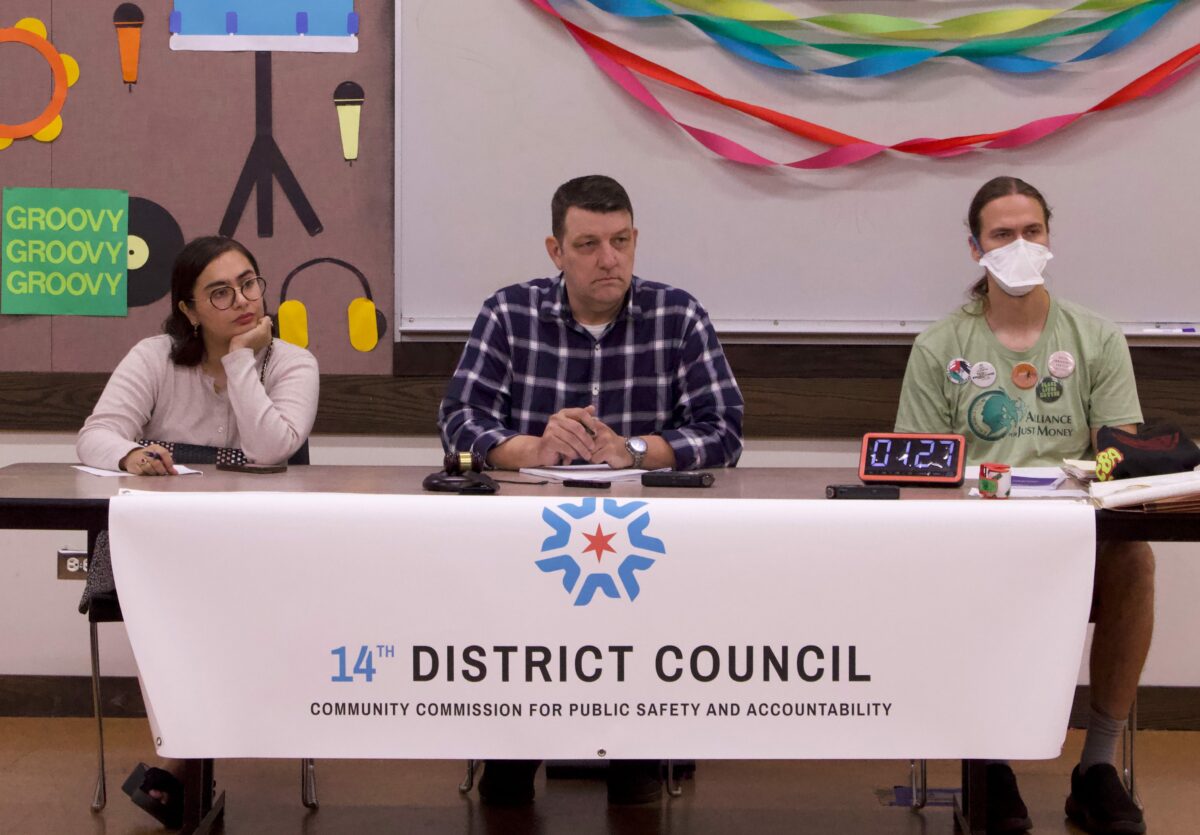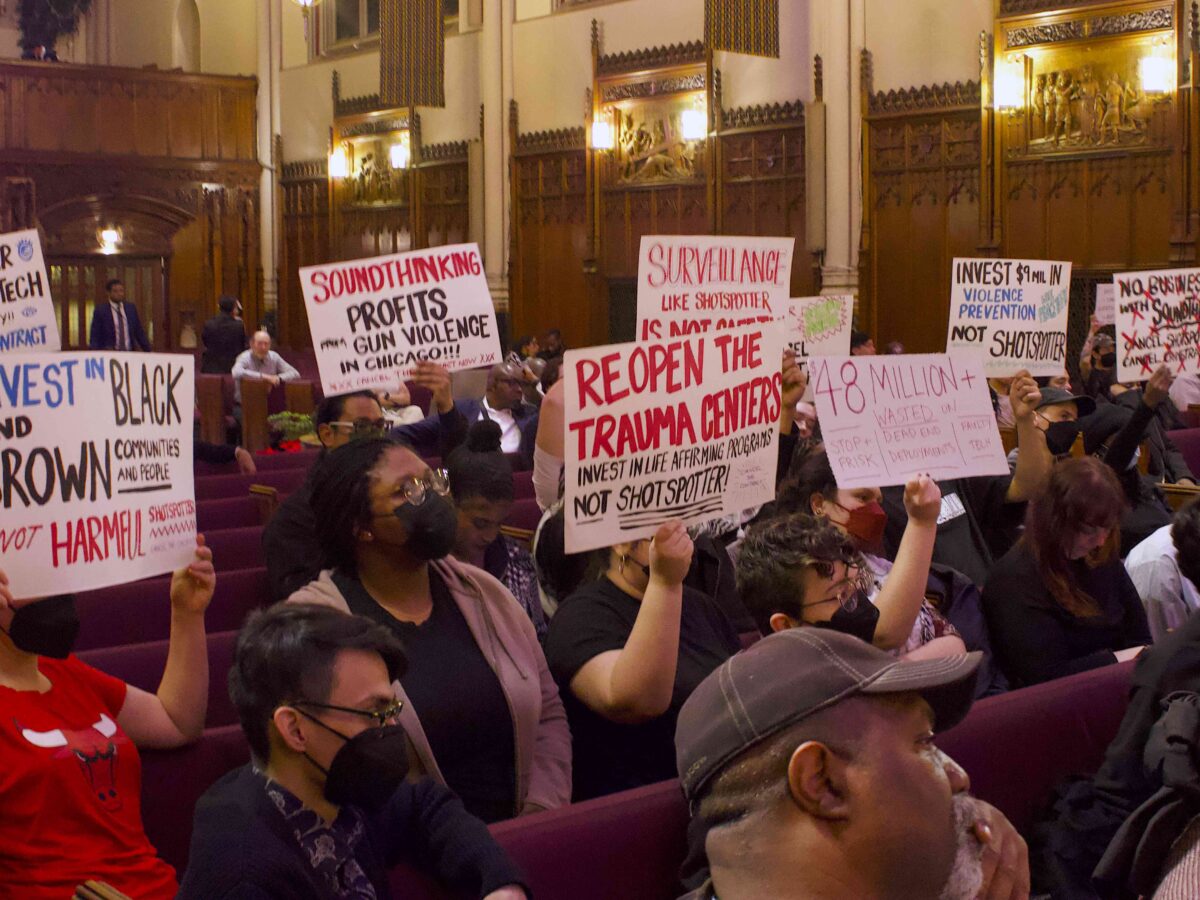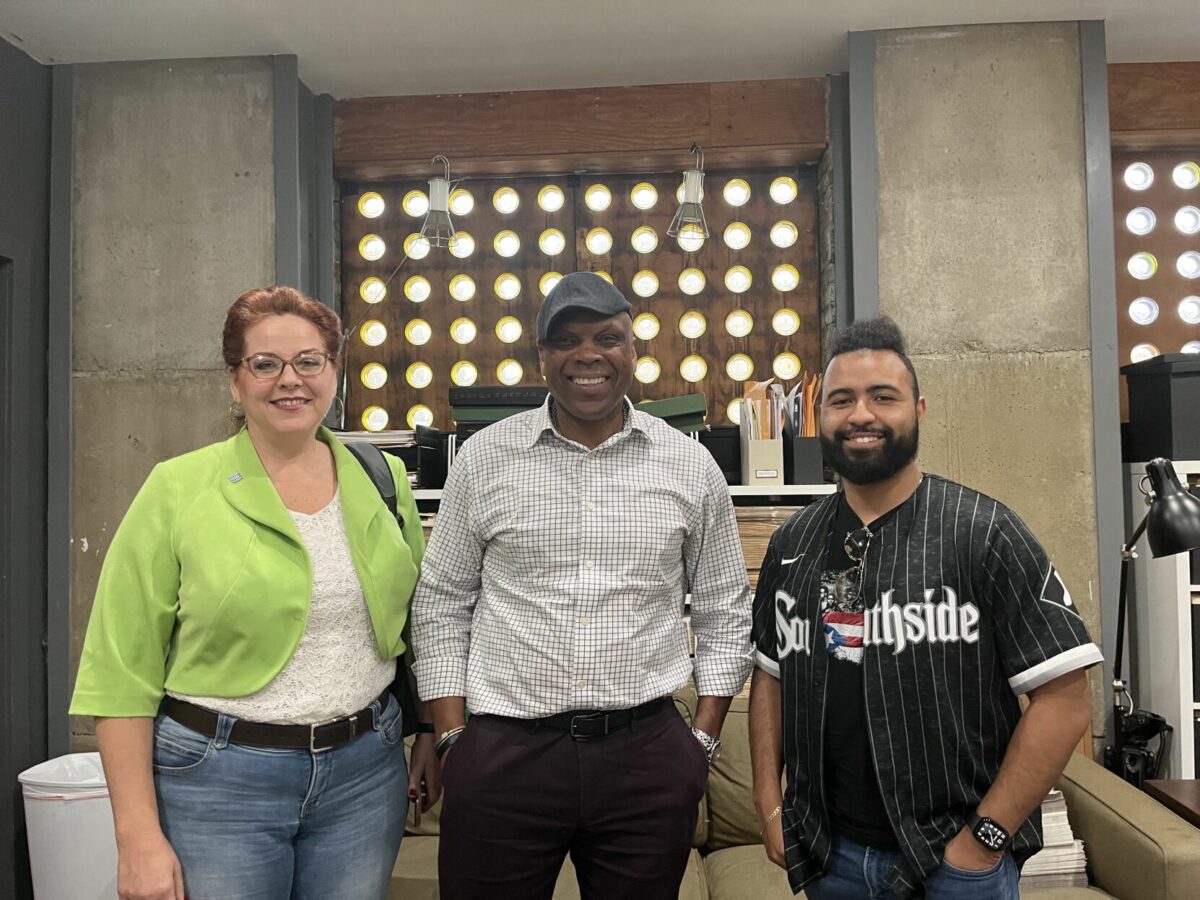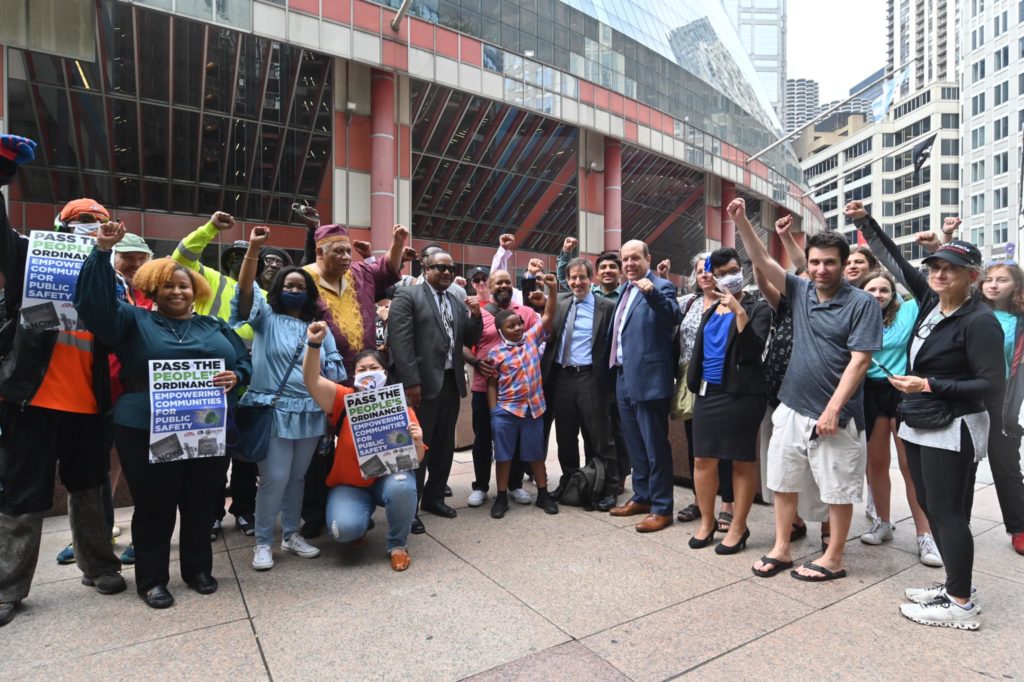Inaugurated last May, Chicago’s twenty-two Police District Councils were tasked with increasing transparency, accountability, and community collaboration with the police. Born out of years of organizing for more civilian oversight, the councils, as well as the citywide Community Commission for Public Safety and Accountability, have grappled with residents’ competing ideas around their purpose.
In the 14th District Council, spiraling political divisions have descended to backdoor politics, shouting matches, and even physical altercations amid accusations one council member was working with a resident to circumvent the authority of the council’s abolitionist majority.
That councilor, Libertarian Party member Chris Laurent, was accused by left-wing councilor David Orlikoff of promoting the work of an independent committee above that of the council. Orlikoff, meanwhile, has shouted down audience members and has been the subject of formal complaints.
Police District Councils (PDCs) and the citywide Community Commission for Public Safety and Accountability (CCPSA) were created by an ordinance passed in 2021 as a compromise between police accountability activists and then-Mayor Lori Lightfoot. Many PDC candidates, new to electoral politics, were given a crash course in running for office by the Empowering Communities for Public Safety (ECPS) Coalition, which advocates for more police accountability and oversight. Others were endorsed, and in some cases funded, by the Fraternal Order of Police (FOP).
Orlikoff and Laurent were the only two candidates to make it onto the ballot in the 14th District, all but ensuring they’d each have a seat on the council. In a Reader candidate questionnaire, Orlikoff selected options such as defunding police and increasing civilian oversight of the department. Laurent’s questionnaire choices supported working with the police and providing them with more resources.
Two other Logan Square residents, Ashley Vargas and Justin Tucker, ran as write-in candidates for the council’s third spot. Tucker, the executive director of the Illinois Libertarian Party, didn’t campaign widely and was not sent a questionnaire. Vargas, who grew up in Logan Square, told the Reader in an interview that she was recruited to run by Alderperson Carlos Ramirez-Rosa. In the questionnaire, she selected abolitionist options.
Orlikoff and Laurent got 16,483 and 10,719 votes, respectively. Vargas won the third seat handily, garnering 4,006 votes to Tucker’s forty-one and giving the 14th District Council a pro-accountability majority.
At monthly meetings at various locations in the 14th District, which includes parts of Humboldt Park, Logan Square, and Wicker Park, Orlikoff and Vargas have attempted to steer the council toward that goal and away from tough-on-crime initiatives. They’ve invited speakers on issues ranging from the SAFE-T Act’s abolition of cash bail to restorative-justice approaches to violence.
“We’re not here to increase arrests or criminalize youth,” Vargas told the Weekly. “We’re here to perfect the accountability system and actually do something about police misconduct.”
Tucker soon became a fixture at council meetings, where he occasionally lobs comments, including proposed parliamentary motions, from the audience. “I get that it’s not my place to do so, and I have no power, really,” he told the Weekly. “My points of order, or whatever, are more or less a heckler’s sort of suggestion.”
He’s among a group of regular 14th District Council meeting attendees who, like Laurent, are primarily concerned with reducing crime. During public comment and question portions of meetings, they’ve occasionally clashed with accountability-minded audience members, as well as Orlikoff.
One regular, a Logan Square resident named Adam Burck, began attending 14th District Council meetings early on, armed with data on robberies and other crimes that he wanted the council to address. Orlikoff and Vargas demurred, preferring to focus on police accountability. Undeterred, Burck started his own group with Laurent’s blessing in October. He named it the Community Committee for Public Safety and Policing Initiatives.
Laurent also agreed to be a counselor-advisor to the committee. “Mr. Burck is very zealous; he’s very organized and he’s very stringent, and this is something he’s very passionate about,” Laurent said. “I can’t tell you how amazing it is to have someone [who’s] that committed to helping his community.” He started attending Burck’s meetings, and the pair routinely exchanged emails about the official District Council. In the fall, Burck and Laurent both attended the CPD Community Academy, a ten-week course on police procedures designed to “designed to build ambassadors” to the community.
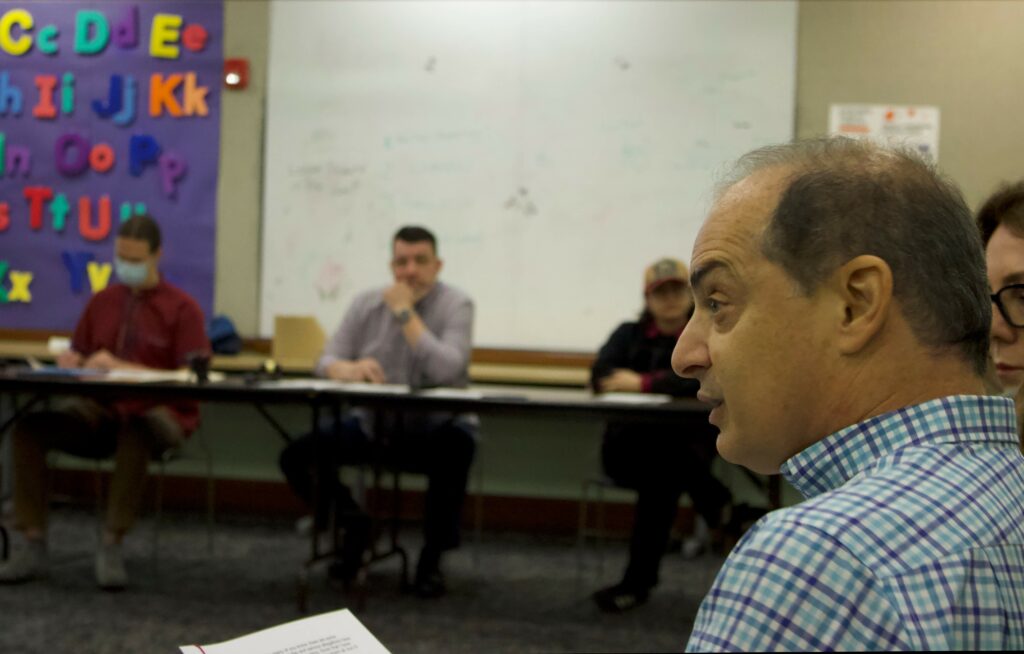
Tensions soon rose over the perceived legitimacy of the committee with respect to the council. Burck began meeting with local alderpersons as well as the 14th District Commander Melinda Linas. Orlikoff and Vargas, meanwhile, said they were unable to get a hold of Linas for months. Orlikoff and others also accused Burck of tacitly misrepresenting his committee as being officially sanctioned by the elected 14th District Council, a charge Burck denied.
But a few residents who regularly attend meetings told the Weekly they’d been confused because Burck’s group often meets at the same locations and on the same days as the official District Council. One person who was granted anonymity so they could speak candidly said they attended what they thought was a 14th District Council meeting at Holstein Park after getting an email invite, only to realize midway through that it was a committee meeting. “I never gave [Burck] my email,” they said. “I didn’t know how they had me on their list. I thought I was coming to the regular council meeting, signing my name…and it turns out I just gave my email to some committee that I had never intended to give my name to.”
Burck also chose imagery and fonts for his email announcements that were similar to official City and CCPSA branding. In December, a CCPSA staffer emailed Burck to ask him to make it clear his was an independent group that wasn’t sanctioned by the District Council. Burck renamed the group the “14th District Public Safety Committee,” added a line noting it was independent, and started using a different version of the Chicago star in his logo.
In March, Burck further clarified the committee’s status in an email to subscribers. “This Committee was created in October 2023 at the invitation of the Chairman of the 14th District CCPSA Council, but is not an official public body and is made up of private volunteers with no power or authority other than our voices,” Burck wrote (emphasis original). “We aim to work cooperatively with the 14th District CCPSA Council, our four Alders, other elected officials, and governmental employees to reduce crime in our community.”
At least one alderperson was also unclear on the status of the committee. In an email reviewed by the Weekly, Ald. Daniel La Spata (1st Ward), whose ward includes part of the 14th Police District, wrote to Orlikoff: “I can affirm the false pretenses; I definitely believed that the District Council had voted to establish his sub-committee and was working in coordination. I appreciate the clarity.” La Spata declined to comment for this story.
Ald. Scott Waguespack’s 32nd Ward includes parts of the 14th, 18th and 19th District Councils. His ward newsletters have sometimes included announcements of Burck’s meetings and occasionally omitted any information about official 14th District Council meetings. Waguespack said Burck told him he was working with Laurent, and he agreed to mention the committee meetings in his newsletters “three or four times.” He added that he’d gotten complaints that Orlikoff had shouted at residents in meetings and didn’t want to promote them because of that.
Orlikoff was incensed by the oversight, as well as an incident in which he says a ward staffer incorrectly referenced Burck’s group as the official one (Waguespack told the Weekly it had been an “inadvertent” mistake). In February, Orlikoff berated the staffer over the phone. He said it was because she told him Waguespack wouldn’t meet with him.
“This was basically him trying to intimidate us,” Waguespack said. “You could hear him yelling from the front door all the way to the back door of the office.” Waguespack got on the phone, and Orlikoff continued “a complete tirade that I couldn’t even keep up with,” cursing and calling him racist. “I was trying to say, like, this is unethical, you’re a City official, you’re acting inappropriately,” Waguespack said.
Two weeks later, Waguespack filed a complaint with the Office of Inspector General (OIG), alleging Orlikoff had violated the City’s workplace violence policy. Orlikoff emailed the OIG in March to complain about several grievances, including the ward newsletters. A spokesperson for the OIG declined to comment on the complaints.
In April, the 14th District Council directly addressed the issue of Burck’s committee at its monthly meeting in a community room at Logan Square Library. The walls were brightly adorned with construction paper ABCs and coloring-book art, and some two dozen people were in attendance. There were several agenda items. Before they could address the committee, however, the meeting descended into chaos.
About forty-five minutes in, amid a discussion of pretextual stops, Orlikoff got into a shouting match with Tucker, Laurent, and Gilbert Jimenez, another tough-on-crime regular and a former public policy and legislative affairs director at the Civilian Office of Police Accountability. At the height of the argument, Orlikoff tried to grab Laurent’s gavel, eliciting gasps from the audience. After a beat, the shouting started again.
“Maintain order when they speak!” Orlikoff shouted.
Not to be outdone, Tucker hollered, “Hey, order, Mr. Orlikoff!”
Orlikoff turned to Tucker. “You do not speak for the council, be quiet!”
“I can speak for anybody I want to!” Tucker yelled back.
Orlikoff made a motion to remove Tucker from the meeting. Neither Laurent nor Vargas—she had not spoken during the shouting—seconded the motion. “I don’t want to exclude anybody,” Vargas said. “If you just, please, don’t raise your voice [or] speak out of order. And, everyone, David is very passionate about this. I just really want to move on.”
Orlikoff agreed to retract the motion, and Laurent asked the room to maintain decorum. The meeting returned to regular business.
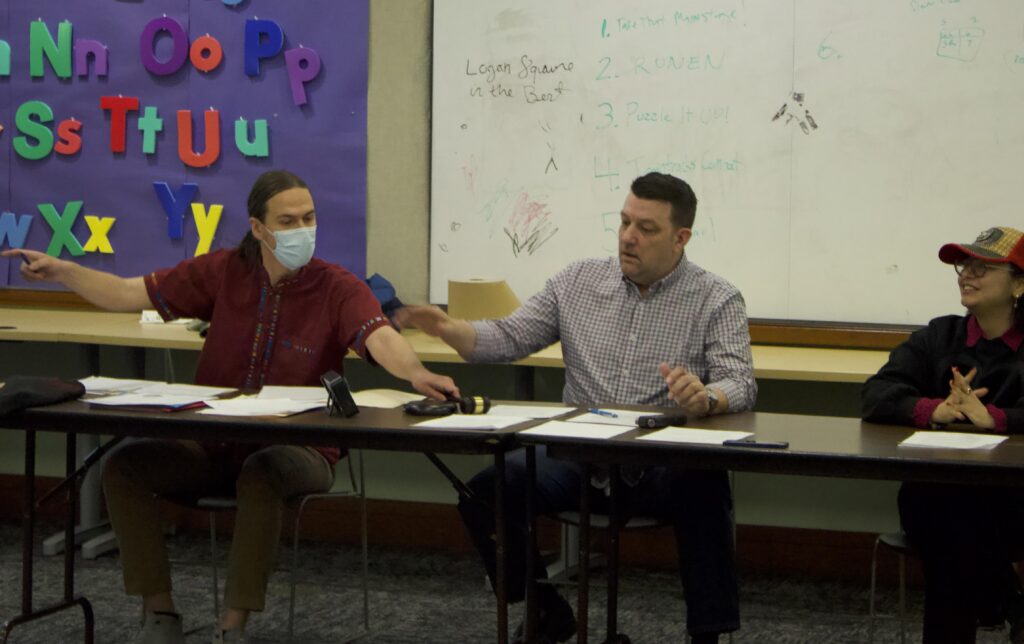
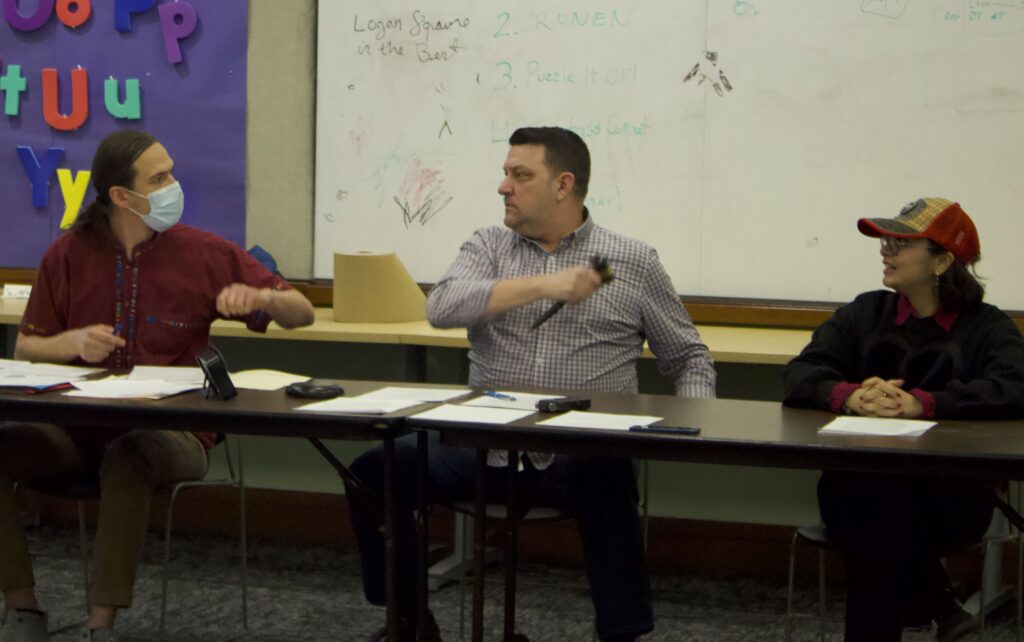
The last item on the agenda was a set of new bylaws introduced by Orlikoff and designed to distance the District Council from Burck’s committee and restrict its activities. One of the bylaws reads: “Groups or individuals who are not explicitly empowered within these Bylaws as official representatives of the 14th District Council should not engage in activities which imply that they represent the Council.” Another prohibits the “impersonation” of public officials. Laurent argued that the council had no power to create bylaws pertaining to an unrelated civilian committee, but was outnumbered. The measure passed, 2-1.
Later that evening, Laurent sent an email to Burck expressing his continued full-throated support for the committee. Burck passed it on to his committee’s email list, and Waguespack reprinted it in that month’s ward newsletter.
“I encourage you all to continue to operate as usual,” Laurent’s email read. “The narrow-sighted decisions of my colleagues will not magically make the problem go away. In short, my support remains with you all and this committee.” Laurent reiterated that he would remain an adviser on the committee and urged its members to “stay vigilant.”
Laurent told the Weekly he filed a complaint about Orlikoff with the OIG; he hasn’t heard back yet.
Since April, Burck and Tucker said that flyers bearing their names and photographs and calling them “parasites” have appeared in the neighborhood. Last month, Burck filed a police report about them. Orlikoff said that he discovered his own mugshot posted on flyers as well last year. Nobody knew who had posted the flyers or why, but everyone suspects they’re related to the District Council meetings.
The April meeting was “exceptionally hostile,” Orlikoff later told the Weekly. He stopped short of disavowing his attempt to grab the gavel, arguing that committee bylaws allow him and Vargas to overturn decisions made by the chair. The bylaws allow Vargas and Orlikoff to overrule the chair by a unanimous vote. They do not allow anyone to seize the chair’s gavel.
In May, a CCPSA staffer gave a presentation on de-escalating tense meetings to councilors in the 5th District Council, and used a video clip of the April meeting as an example. When Orlikoff found out, he was livid. He called the staffer to complain, and the discussion reached an impasse. Orlikoff flew off the handle.
By all accounts, Orlikoff repeatedly called the staffer a “horrible piece of shit.” The staffer filed a workplace complaint. On Monday, Orlikoff said that he and the staffer have agreed to mediation.
Fed up, CCPSA President Anthony Driver sent Orlikoff a stern text message, admonishing him to “stop threatening staff” and calling the behavior “disgraceful, racist, and bullying.” Orlikoff replied with an expletive-laden barrage that called Driver, among other things, a “dumb fucking stooge” and a “pathetic self serving failure,” and blamed the CCPSA president for Dexter Reed’s death. Driver declined to comment for this story.
Orlikoff said he has undiagnosed autism, but added that while he’s had difficulty with communication and being misunderstood by neurotypical people, that’s not the reason for his language. Due to personal trauma he’s experienced, “when someone tells me they aren’t going to listen to me at all, it becomes much more difficult for me to care about what I say to them,” he said. “I understand that when I respond emotionally, it is most often counterproductive.”
More recently, the factions at 14th District Council meetings seem to have reached a kind of détente.
Despite the new bylaws, Burck’s committee has continued to meet. He said he has “stayed in touch with our alders and the [14th District] commander’s office,” and is keeping a “close eye on crime, and especially robbery.” He and Tucker, as well as accountability-minded residents, have been in attendance over the summer, but meetings haven’t collapsed into shouting matches.
In June, Commander Linas attended a 14th District Council meeting, which Orlikoff and Vargas attributed to a months–long pressure campaign by accountability-minded residents. That meeting was comparatively serene. Tucker heckled only once, and the councilors and audience members remained polite throughout, even as Linas declined to answer tough questions about an officer in the district with ties to the far-right Oath Keepers organization. The meeting highlighted a challenge many councils, and even the CCPSA, have grappled with, namely: if police—from CAPS officers up to the superintendent—are reticent, these civilian oversight bodies can’t compel them to be more forthcoming.
On Sunday, nine residents attended the July 14th District Council meeting at Humboldt Park Library. Burck and Tucker were in the audience, as was a representative of the Grassroots Alliance for Police Accountability and an activist sporting a hammer-and-sickle tattoo and a “Free Palestine” t-shirt. There was a brief debate over who should be in charge of the District Council’s email list, but the discussion remained civil.
As is the case with many of the District Councils, the debate is ongoing in the 14th. Despite the cooled tensions, questions remain about the future of police accountability and public safety.
“We’re still working on it,” Vargas said after Sunday’s meeting. “We definitely want to work with everybody in the 14th District, and there’s always room to be better.”
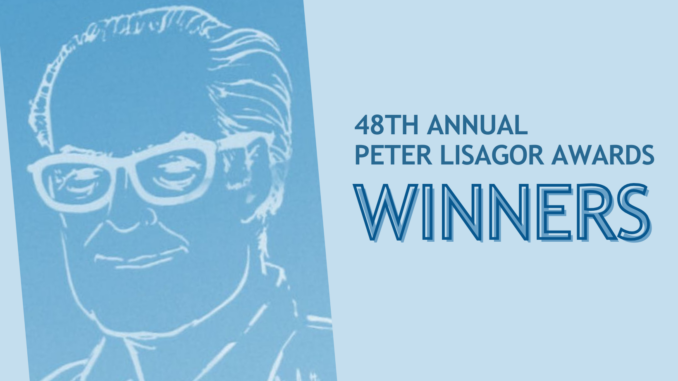
Jim Daley is the Weekly’s investigations editor.

